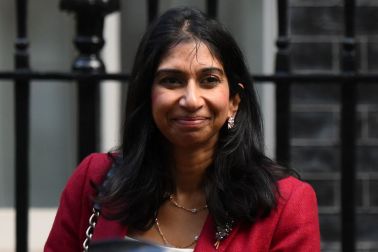When I moved to Rostov-on-Don, in the south of Russia, in 2018 for what was to be four happy years, (ending abruptly on 24 February) there was a baker’s shop, one among many, on the main thoroughfare of the city. I wandered past it countless times before noticing a pair of signs hanging outside, one in English, one in Russian. The Russian one, picked out in pokerwork, simply said ‘Pederasti zaprishonyi’. Beside it, its English translation read: ‘Faggots not allowed.’
The effect of noticing these words for the first time was like a punch to the stomach, a reaction which never quite wore off however many times you saw it. People harbour all sorts of hidden prejudices, but the brazenness with which the owner of this shop exhibited his own reminded me that, however comfortable I felt in the city, I was nonetheless in a foreign country. Yet it wasn’t, at that time, quite as hostile as one might have feared. The police in Rostov soon intervened, told the bread-maker to take the signs down. He refused; his shop subsequently closed down.
Yet in the coming month our Russian baker may have more to savour than the smell of rising sourdough. This month, the State Duma are voting on whether draconian laws should be passed against ‘LGBT propaganda’ – even among adults. If endorsed, it will almost certainly make it impossible to have LGBT characters, or discuss any related themes on television, in plays, books, films or even in a restaurant. It will mean the total effacement of LGBT voices, effectively, from any area of Russian public life.
The proposed legislation would come nearly ten years after a similar nationwide law introduced in June 2013. This effectively used a ban on the distribution of materials promoting LGBT relationships among minors to usher in a number of other prohibitions. In the presence of anyone under 18 you were forbidden to hold gay pride events, speak in favour of gay rights, or state that gay relationships had the same validity as those between heterosexuals.
The legislation will effectively make it impossible to refer to LGBT matters except damningly or in hushed voices
Putin, it seemed, saw political capital in positioning himself as a bulwark against the liberal West – something that the years since have borne out in spades – and the law’s passage was greased by several state-employed cheerleaders. Politician Yelena Mizulina, head of the parliamentary committee on the family, had declared in 2012 that ‘propaganda of homosexuality [was] widespread in Russia’ and created ‘the conditions for limiting a child’s freedom to choose his own sexual preference when he grew up’. In tones familiar from similar Russian propagandists of the last few months, television host Dmitry Kiselev ranted that it wasn’t ‘enough to fine gays for propaganda to teenagers. We need to ban blood and sperm donations by them, and if they should die in a car accident, we need to bury their hearts underground or burn them…’.
Mizulina and Kiselev didn’t, of course, speak for everyone in Russia. The country is not monolithically homophobic, as anyone who has lived there will confirm. It is, rather, chaotic, arbitrary and unpredictable in this respect, as so much there is (indeed, this broader chaos is part of Russia’s charm). St. Petersburg’s Duma representative, politician Vitaly Milonov, was taken to task by Stephen Fry in 2013 for his homophobic law-making. Nevertheless, the city is also known as the most gay-friendly place in Russia.
It was also in St. Petersburg, in 2019, that a court surprisingly ruled in favour of a transgender woman’s claim that she had, due to her gender, been unlawfully dismissed from her job. Homophobic slurs are sometimes tossed around depressingly and there are more than the usual amount of snickering, infantile jokes between insecure young men about ‘gays’. Yet an openly LGBT colleague at the Russian school I taught at was also the most popular teacher there, with a gang of teenage students – male and female – who hung on his every word. Though as a Westerner I was warned by a local that I ‘mustn’t wear make-up in the streets’ – I had no plans to, I assured her – there is now a small but growing vogue, even in provincial cities, for young men to wear nail varnish. Nothing inside Russia is ever quite what its international image would have you believe.
Yet 2022 has seen a radical strengthening of the Russian state. Anti-gay laws – supported by the Orthodox Church – are seen, as the writer Masha Gessen pointed out, ‘as an attribute of strong state power.’ As for the legislators themselves, any psychologist who’d seen photos of a Putin half-naked on horseback or, in a YouTube clip, kissing a young boy’s stomach, would have a field day deducing their motivations.
Vyacheslav Volodin, Chairman of the State Duma, posted a Telegram poll this summer on whether his followers considered it ‘necessary to introduce a ban on propaganda of non-traditional values’. He himself stated that he firmly believed in introducing one. Yet Volodin is also a politician whose sexuality has been whispered about so much online, along with a routine accusation in the state media that this was a US smear. As a result, it became a common joke at one point in Russia to follow any mention of the man’s name with the words ‘and by the way Volodin is not gay’. It was a slogan taken up in 2015, when subversive posters were hung in Moscow stating that not only was Volodin still ‘not gay’, but also German Gref (the head of Russia’s Sberbank) was definitely ‘not gay’ either. This settled the matter once and for all and it’s surely Volodin’s emphatic and even flamboyant not-gayness that has made him such a keen advocate of this new campaign.
As often in Russia, one sees the blackly comic side of these things. But there is nothing funny at all about the proposed legislation. It will effectively make it impossible to refer to LGBT matters except damningly or in hushed voices, the terms of the prohibition being elastic enough for authorities to attack and prosecute anyone they like. Set beside it, the UK’s infamous Clause 28 of 1988 seems almost mushily weak-willed.
Clause 28, has, of course, been banished to the history books. But the West’s attitude towards LGBT issues remain helpful, even if inadvertently, to Putin. Every bondaged-costumed participant at Pride, every BBC programme wittering on about multiple genders, every Rainbow-coloured police car and LGBT sandwich has been noted down by the Russian media, passed on to its viewers and has played right into Putin’s hands.
With a ‘they shall not pass!’, Putin – like many other despots worldwide – has been allowed to present himself, at least until this year, as a bulwark of tradition and the Great Alternative. As Western activists, event organisers, corporate trendsetters, commissioning directors and advertisers giddily ascend their virtue spiral – viewed not always with unqualified approval by the world outside – the bill is being paid elsewhere by LGBT people who dream simply of being left in peace to live a decent life. Later this month, in Russia, they may find themselves drastically less able to do so.









